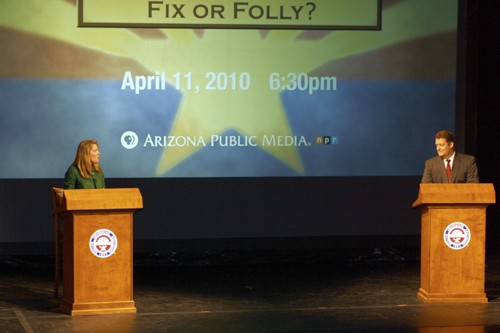Members of the media, legislature and business world debated Proposition 100’s one-cent sales tax increase Sunday night in a forum aptly named “”Arizona Sales Tax: Fix or Folly.””
Moderated by Bill Buckmaster of Arizona Illustrated, the debate featured pro and con debators, an economist for monetary perspective and media members to deliver questions. Audience members were welcome to engage in the Q-and-A session as well.
“”We’re here tonight to discuss the future of the state of Arizona,”” Buckmaster said as the hour-long forum commenced Sunday.
Proposition 100 is a temporary increase in the Arizona sales tax from 5.6 to 6.6 cents on each dollar, with two-thirds of the money earmarked for education and the other one-third reserved for health care and public safety services. The three-year tax will be passed or rejected in the special election vote on May 18.
Ann-Eve Pedersen, president of the board of the Arizona Education Network and former journalist for the Arizona Daily Star and Tucson Citizen, represented the pro-Proposition 100 stance. Farrell Quinlan, the Arizona state director of the National Federation of Independent Business, represented the con side.
Playing to a strongly pro-audience, the first claps of the night were garnered by Pedersen when she addressed the business climate in relation to education.
“”They way that we attract companies to Arizona and the way we keep companies here is by providing a quality education system,”” Pedersen said. “”If we gut our education system, we are putting up a closed for business sign in front of the state of Arizona.””
Although both sides admitted Proposition 100 is not a full solution but rather a stop-gap measure to stop the estimated $107 million to be cut from state universities — $42 million from the UA alone — Quinlan said Proposition 100 may open the door for new taxes.
“”Prop. 100 does not solve the problem. I’m not saying cut taxes, I’m just saying don’t raise them,”” Quinlan said. “”We have a huge depression in revenues in the state. Raising taxes and squeezing more out of the folks who don’t have the money is not the answer.””
Mark Stegeman, UA economics associate professor, was among the handful of audience members who asked questions of the panel.
“”They both showed the intensity of their beliefs, and that reflects the intensity in their community,”” Stegeman said.
Media members included Jim Nintzel from the Tucson Weekly, Linda Valdez of The Arizona Republic and Tom McNamara from KVOA-TV Channel 4. Stanley S. Reynolds, Eller College of Management economics professor, acted as a neutral economist for the panel.
Organized by the Arizona Students’ Association and the Associated Students of the University of Arizona in partnership with Arizona Public Media, the forum was held on campus to educate people affected.
“”A ‘Yes’ vote on Prop 100 is a vote for yourself and a vote for your future,”” said Elma Delic, board chair for ASA. “”The first thing they see is a sales tax and think they’ll be paying more. I don’t think they really see how much money this will bring in for education and public safety. I really think that students need to understand that.””
ASA will hold events on the UA Mall this week, including free Eegee’s and cotton candy, for students to register to vote and get more information about Proposition 100.
Pedersen, who likened a vote for Proposition 100 as “”a vote for education not incarceration,”” felt the need for students to get involved as well.
“”The quality of the education (students) are going to be receiving is going down,”” Pedersen said. “”The UA has already lost 600 jobs and cut 24 programs, and without (Prop 100) it will lose 500 more jobs and definitely have to cut more programs.””









